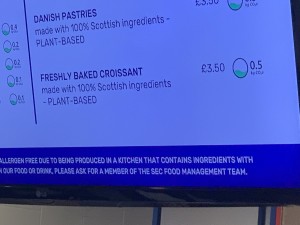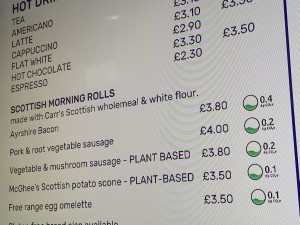A bacon roll has a lower carbon footprint than a plant-based croissant, at least according to the menu at food outlets at the COP26 climate change summit.
With the farming sector under the spotlight at the massive international climate change summit taking place in Glasgow, the revelation by a BBC reporter this morning has gone well with the pig sector.
The reporter said: “One thing I have learned this morning – they have got carbon counts on all the dishes on the menu – and it turns out that a croissant, which is plant-based, which we are all told is better for the environment, actually has a slightly bigger carbon footprint than a bacon roll. Who knew?”
This was subsequently confirmed by photos showing the carbon footprint of an Ayrshire bacon Scottish morning roll to be 0.4kg CO2, while a plant-based croissant with 100% Scottish ingredients was 0.5kg CO2.
This was welcomed by the farming industry on social media.
BQP’s Mark Jagger, who tweeted the original clip, observed: “Ohh, bacon roll better for the environment.”
Irish producer Shane McAuliffe said: “We pig farmers knew this all along! #Sustainability #COP26”

The account Pasturetec added: “The BBC reporting on #cop26 said that the food choices at the conference have carbon values on them and apparently a croissant has a higher carbon output than a bacon roll #smallwins #ukagriculture #cop26 @pigworldmag @AHDB_Pork”
Lee Thompson added: “This is what the British pork industry needs! Good work getting it online @piggy_jags.”
Carbon footprint
While this is only one small comparison, the pig sector is trying hard to improve its carbon footprint. Ahead of COP26, two major UK pork processors set out their sustainability credentials, particularly regarding the sourcing of soya.
Pilgrim’s UK has committed to using fully verified, zero-deforestation sustainable soya to feed its pigs by 2025. It claims to already have the lowest soya usage in pig diets in Europe, which it said has been validated for the last two consecutive years.
Meanwhile, Cranswick has announced that it has received carbon neutral certification for all 14 of its eligible UK manufacturing sites, having already reduced its relative carbon emissions by 18% in the last financial year.
Cranswick CEO Adam Couch said: “We recognised in 2018 that tackling climate change is everyone’s responsibility and, as a leading operator in the food industry it was incumbent upon us to play our part.”





